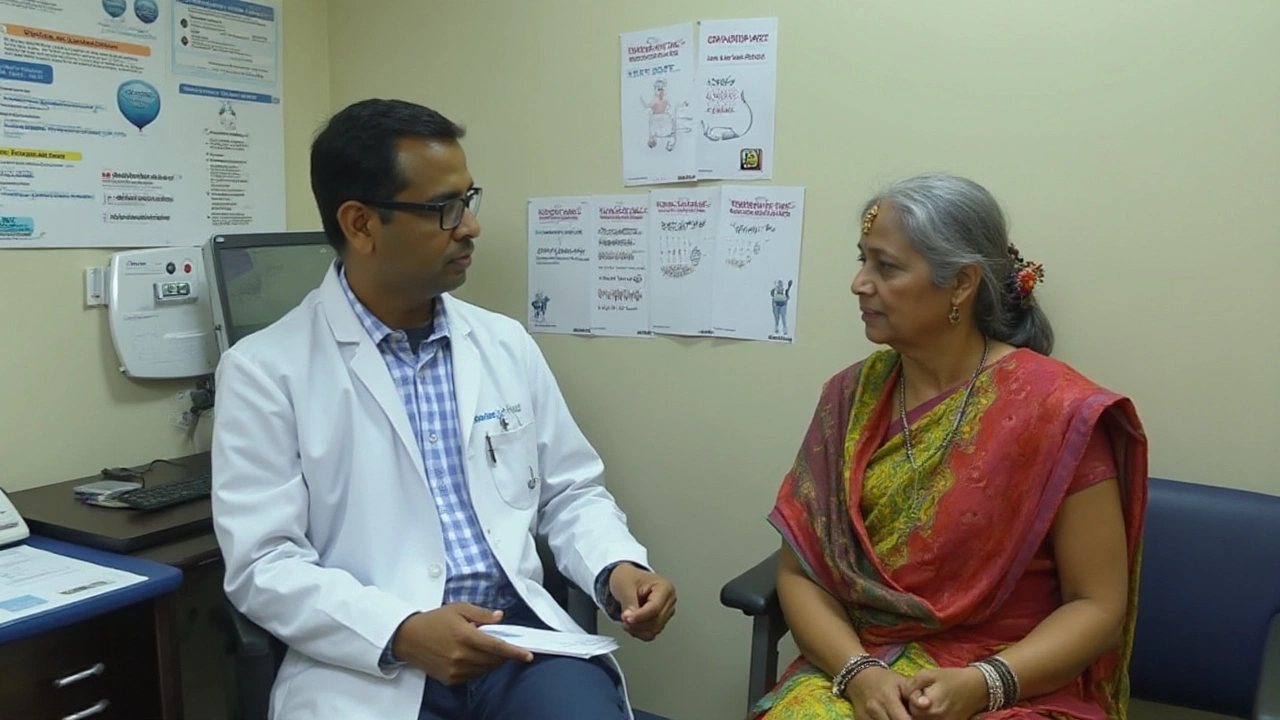Keeping up with regular health checkups is like making sure your car's engine is running smoothly. It helps catch any potential problems early on, often before they become serious. But have you ever wondered what really goes on during these checkups?
A typical health checkup involves a range of tests designed to check for various aspects of your health. From basic measurements like blood pressure and heart rate to more specific screenings, these tests can give you a comprehensive picture of your current health status.
Understanding what's covered in a health checkup can help you prepare better and stay informed about your well-being. It's more than just routine; it's a proactive approach to staying healthy.
- The Basics of a Health Checkup
- Common Tests Included
- The Importance of Regular Checkups
- Preparing for Your Health Checkup
The Basics of a Health Checkup
Health checkups are a crucial aspect of preventive healthcare, designed to safeguard your well-being and catch potential health issues early. It's like giving your body a routine tune-up to ensure everything is functioning as it should be. During a health checkup, doctors perform a series of evaluations to assess your current health status. These evaluations typically include a thorough physical examination, a variety of screenings, and sometimes, vaccinations, depending on your age and medical history. By keeping track of your health metrics regularly, you can make informed decisions about your lifestyle and medical care. You'll usually start with basics like height, weight, and a rundown of your medical history, followed by listening to your heart and lungs. Think of the stethoscope as a detective tool, helping your doctor identify any clues about your heart's health.
The physical examination forms the cornerstone of most checkups, helping professionals gather vital signs and provide a framework for interpreting other results. Blood pressure and heart rate readings, for instance, offer insights into your cardiovascular health, which is crucial in preventing major diseases. Additionally, data from blood tests can reveal essential information about cholesterol levels, blood sugar, and organ function—elements that are key in assessing risks for conditions such as diabetes and hypertension. These tests might sound routine, but they play an integral part in painting a precise picture of your health. You might think of them as puzzle pieces that combine to form an image of your physical well-being. Here's a fun fact: early detection and treatment of various conditions due to regular health checkups have increased life expectancy by approximately 3.5 years over the last few decades.
Your personal and family medical history is pivotal during these assessments. Doctors review factors like allergy history, previous surgeries, and family diseases, which help dictate the specific screenings they recommend. If there's a family history of diabetes, for instance, you might undergo additional glucose tests. It's in these reviews that patterns often emerge—patterns that can shine a light on preventative steps suited specifically for you. Regular checkups not only provide peace of mind but motivate lifestyle adjustments that promote better health. Quoting a study published in the Journal of the American Medical Association, “Periodic health examinations remain an important aspect of clinical care that reinforces the physician-patient connection and allows for personalized interventions.”

Common Tests Included
When it comes to health checkup packages, there is a wide array of tests typically involved. These tests cover various aspects of your health, aiming to provide a comprehensive picture of your physical state. One of the standard inclusions is a complete blood count (CBC), which evaluates your overall health and detects a range of disorders, including anemia, infection, and leukemia. A CBC tests several components of your blood, including red blood cells, white blood cells, hemoglobin, hematocrit, and platelets. Each of these plays a crucial role in maintaining your body's balance and functionality, and deviations from the norm can signal underlying health issues that require attention.
Medical examination components often include tests to measure cholesterol levels. This usually involves both high-density lipoprotein (HDL) and low-density lipoprotein (LDL) checks, also known as the 'good' and 'bad' cholesterol. Maintaining healthy cholesterol levels is vital, as high levels of LDL can lead to plaque buildup in the arteries, increasing the risk of heart disease and stroke. Regular monitoring through health checkups allows individuals to take action in adjusting their diet and lifestyle if necessary.
According to Dr. Max Cooper, a cardiologist at HealthFields, "Identifying cholesterol levels early can help in creating a personalized plan to prevent cardiovascular issues before they become dangerous."
Another key component of health screening is checking blood pressure. High blood pressure, or hypertension, is often dubbed the "silent killer" because it presents no obvious symptoms yet can lead to severe health complications if left unmanaged. Regular blood pressure screenings help keep track of whether your readings stay within a healthy range, which is an essential part of preventive care.
| Test | Purpose |
|---|---|
| CBC | Evaluates general health and detects diseases |
| Cholesterol Test | Monitors heart health |
| Blood Pressure | Detects hypertension and related risks |
Glucose tests are also a routine part of many health checkups. These tests are crucial for screening for diabetes or pre-diabetes conditions by measuring sugar levels in the blood. Detection of abnormal sugar levels is fundamental in managing one's diet and lifestyle to prevent or control diabetes effectively. Glucose tests coupled with body mass index (BMI) assessments provide a clearer picture of a person's metabolic health, aiding in better management strategies.
In addition to these, routine health checkups often include screenings specific to age and gender. For instance, mammograms for women and prostate exams for men are common. These tests aim to detect any early signs of cancer, significantly improving the chances of successful treatment. As preventive care continues to be a vital aspect of modern medicine, regular health screenings empower individuals with information, allowing them to take control of their health and make informed decisions regarding their well-being.

The Importance of Regular Checkups
It's easy to overlook the significance of regular health checkups when life's clock is ticking faster with each passing day. Many of us tend to visit doctors only when something feels out of the ordinary, but by that time, the issue might have already escalated. Making health checkups a part of your routine is like giving your future self a gift of health.
Astonishingly, the Centers for Disease Control and Prevention (CDC) estimates that regular screenings could prevent over 100,000 deaths each year. Often, the early stages of potential health issues are silent. Medical examinations during these checkups can uncover these hidden threats, and offer the opportunity to address them before they grow into a larger concern. It's not just about dissecting problems – it's also about paving the way for future wellness.
For example, routine blood pressure checks can help detect hypertension, which often has no symptoms but is a major risk factor for heart disease and stroke. Diabetes screenings are equally vital, as they can catch early signs of the disease, often long before you would notice any symptoms yourself. The relationship between early detection and treatment isn't just backed by anecdotal evidence; it's a scientifically validated approach known to enhance longevity and improve quality of life.
"Preventive care through regular checkups is essential to avoiding more serious health complications later on," remarks health expert Dr. Lisa Sullivan of the Wellness Institute.
Beyond disease prevention, regular checkups help you establish a strong relationship with your healthcare provider. By attending scheduled appointments, you allow your doctor to understand your baseline health, making it easier for them to notice changes over time. Health checkups thus serve a dual purpose – as a tool for disease prevention and as a foundation for ongoing health monitoring.
Moreover, these appointments are opportunities to focus on lifestyle and behavioral factors that contribute to your overall health. Discussions on diet, exercise, and other habits with your doctor can lead to beneficial lifestyle changes. Preventive care encompasses not just medical assessments, but also the promotion of healthy living practices that reduce risks for a variety of chronic diseases.
Personalized Health Monitoring
The beauty of regular health checkups lies in the personalized care they promote. Personalized care takes into account your family history, age, gender, and other factors that play a critical role in your health. It isn't a one-size-fits-all approach; rather, it's a tailored strategy that recognizes your unique health profile, thus enabling your healthcare provider to offer personalized advice and interventions.Sure, the numbers on paper, the cholesterol levels, and the blood sugar readings are crucial. But the stories behind those numbers, the daily routines, the stressors, and the successes are equally important. This personalized attention can empower individuals, guiding them toward more informed health choices based on their specific circumstances.
Ultimately, regular checkups are a proactive step toward safeguarding your health and well-being. They're not just appointments you tick off your calendar; they're investments in your future. Investing this time in your health could be one of the wisest decisions you make. Regular checkups emphasize the principle that prevention is better than cure, a mantra that holds true across all areas of life.

Preparing for Your Health Checkup
Getting ready for a health checkup involves more than just marking the date on your calendar. It's about taking small, but meaningful steps to ensure you and your healthcare provider get the most from the visit. To begin with, it's crucial to gather all necessary paperwork, such as previous medical records or insurance documents. These can provide a detailed account of your medical history, which is vital for any doctor assessing your health. Don't forget to make a list of any current medications or supplements you are taking; this includes vitamins and herbal supplements. This information is key as certain tests might require adjustments in your medication beforehand.
Another critical aspect of preparing for a medical examination is fasting, which is often required for blood tests. Not all tests need fasting, but many, like blood glucose and cholesterol levels, provide more accurate results when you're fasting. Typically, fasting means no food or drinks other than water for 8 to 12 hours before the test. It's best to check with your healthcare provider to confirm fasting requirements specific to the tests you're scheduled for. Besides fasting, staying hydrated is vital. Drinking water ensures that your veins are more accessible, making blood draws smoother and less stressful.
Mental preparation is equally important as physical preparation for your health screening. Make a list of concerns or symptoms you might have noticed since your last checkup. Open and honest communication with your doctor helps identify potential health issues early. This is your chance to ask questions about your health or recent changes in your body, so take advantage of it. As renowned physician William Osler once said,
"The good physician treats the disease; the great physician treats the patient who has the disease."Your role in this is clear communication.
Don't overlook the importance of comfort during your visit. Wearing loose, comfortable clothing can make the process easier, particularly if you need to change into a medical gown. Practical attire helps during physical exams or procedures like ECG, where electrodes need to be attached to the skin. Finally, it can be beneficial to have a relative or friend accompany you. They can provide moral support and help remember important details discussed during the appointment. A well-prepared visit not only saves time but also contributes to a more accurate and comprehensive understanding of your health.





